EXTENSION OF REGISTRATION DEADLINE
Due to technical problems on the platform that led to a delay on the start of registrations, the registration deadline (Art. 10 and 17 of the DR 2024 notice of 25.2.2025) is extended to 4 p.m. on 12.4.2025.
RANKING LIST - FOURTH ADMISSION TEST - 28.03.2025
The candidates can register starting at 4 p.m. on tuesday 1 april 2025 and mandatorily by 4 p.m. on monday 7 april 2025.
The matriculation process is considered finalized with full payment of the first installment of tuition, registration fees, regional fee and stamp duty.
MODALITY OF IMPLEMENTATION OF THE ADMISSION TEST
The admission test for the Healthcare Professions Courses for the academic year 2024/2025, provided for in the call issued by R.D. n. 2024, will take place on 28.3.2025. The candidates are convocated at 10.00 a.m. and the test will begin at ore 10.30 a.m.
BRANCH:
-
For candidates who have chosen to take the test at the Rome branch:
Link Campus University, via del Casale di San Pio V, 44 (near Piazza di Villa Carpegna) Ancient Library
(Free parking is available on site) -
For candidates who have chosen to take the test at the Città di Castello branch:
Link Campus University, via Carlo Marx, 20 – Classroom 1
(Free parking is available on site)
For the academic year 2024-2025, enrolment in the Degree courses in the healthcare professions with programmed access, listed in the table below, is subject to passing an admission test.
| n. | Class | Course | Branch |
Places EU |
Places extra EU |
|---|---|---|---|---|---|
| L05 | L/SNT1 | Nursing (qualifying for the healthcare profession of Nurse)* | Città di Castello – ASL n. 1 Umbria | 90 | 10 |
| L06 | L/SNT2 | Physiotherapy (qualifying for the healthcare profession of Physiotherapist)* | Città di Castello – ASL n. 1 Umbria | 65 | 10 |
| L07 | L/SNT4 | Osteopathy (qualifying for the healthcare profession of Osteopath)* | Rome Ospedale San Pietro via Cassia | 65 | 10 |
| L08 | L/SNT4 | Osteopathy (qualifying for the healthcare profession of Osteopath)* | Città di Castello – ASL n. 1 Umbria | 65 | 10 |
The admission test for the degree courses in the healthcare professions is identical for access to all the types of courses activated at the same university and during the test the candidate must proceed to enter, on the personal data sheet, the choice of courses and the relative location, in order of preference, up to a maximum of 4 options, one of which is compulsory.
The choice of at least one degree course is compulsory, if the candidate does not make any choice they will be excluded from the evaluation and consequently from any ranking list.
In the event of any of these scenarios occurring, the University will issue a special notice to make the remaining places available to candidates who have taken the test at other universities and were unable to matriculate due to a shortage of places.
*Territorial tax incentives
The University provides for important territorial tax incentives for students enroled in courses at the Città di Castello branch of the University and resident in:
- Città di Castello: 30% discount on the tuition fee
- province of Perugia and Arezzo: 20% discount on the tuition fee
- regions of Umbria, Tuscany and Marche: 10% discount on the tuition fee
Admission test date
The admission test will be held on 28/03/2025 at both the Rome and Città di Castello (PG) branches of Link Campus University.
The locations for the admission test will be determined on the basis of the number of applications received and may also be located outside the venues of the university.
The time when candidates will be convened the locations of the test will be published by 24/03/2025.
Submission of the application for the admission test
Registration for the admission test must be carried out within 4 p.m. on 28/2/2025 and must be completed by 4 p.m. on 24 March 2025, along with the payment of the test fee.
During the registration phase, in addition to entering all the data required by the procedure, the candidate must specify the location chosen for the test, provide consent to the processing of personal data and acknowledge having read the present Call.
Test topics and admission criteria
The candidate must proceed to enter, on the personal data sheet, the choice of courses and their location, in order of preference, up to a maximum of 4 options, one of which is compulsory.
The admission test consists of a written multiple-choice test presenting five answer options, from which the candidate must identify only one, discarding any incorrect, arbitrary or less likely conclusions. It consists in 60 questions in Italian on the basis of the syllabuses provided for in Attachment A and distributed as follows:
- 4 questions of reading skills and knowledge acquired throughout the studies
- 5 questions of logical reasoning and problems
- 23 questions of biology
- 15 questions of chemistry
- 13 questions in physics and mathematics
The admission test will last 100 minutes.
Ranking and publication of results and procedure for managing takeovers
By 1 April 2025, the general merit list will be published anonymously using the candidate's pre-registration number, as well as the individual course rankings, also anonymously.
After publication, the boxes of the biographical data sheets will be opened in public session to allow the candidate code and biographical data to be matched.
For applicants from non-EU countries living abroad, an autonomous general ranking list and autonomous individual course rankings are established by the University.
Candidates placed in a useful position in the individual course rankings are admitted to the course and may therefore proceed with the enrolment.
The deadline for registration is 4 p.m. on 7 April 2025.
Each candidate will be included in all rankings for the chosen courses.
The candidates may only enrol in the course for which they are eligible; if they are eligible for more than one ranking list, they may only enrol in the course for which they have expressed the highest order of preference.
Candidates who do not register by 4 p.m. on 7 April 2025 will be considered withdrawn.
Enrolment requirements
Enrolment is finalised upon payment in full of the first instalment of the tuition fee, registration fee, regional tax and stamp duty.
Failure to complete enrolment by the deadline referred to in the previous article shall entail the renunciation of enrolment and shall result in the rankings being reversed.
Summary table of deadlines and privacy notice
| Activity | date | See Article Notice |
|---|---|---|
| Registration application |
From 4.00 p.m. on 28.2.2025 to 4.00 p.m. on 24.3.2025 |
Article 4 |
| Publication of candidate convocation time and test location | 24.3.2025 | Article 3 |
| Implementation of the admission test | 28.3.2025 | Article 3 |
| Publication of the ranking list | Within 1.4.2025 | Article 10 |
| Deadline for matriculation candidates | Ore 16 del 7.4.20255 | Article 10 |
| Publication 1° take-over | Entro 9.4.2025 | Article 10 |
| Request for change of course to better choice | Within 12.00 on 12.4.2025 | Article 10 |
| Payment of any tuition fee | Within 12.00 on 12.4.2025 | Article 10 |
| Deadline for registration of first take-over candidates | Within 12.00 on 12.4.2025 | Article 10 |
| Payment of the 2nd instalment | 7.05.2025 | Article 11 |
| Payment of the 3rd instalment | 9.06.2025 | Article 11 |
| Payment of the 4th instalment | 8.07.2025 | Article 11 |
The Course of Study in Osteopathy provides the scientific basis and theoretical and practical preparation necessary to be licensed to practice as an Osteopathy. The Osteopath, the graduate is the healthcare professional who carries out interventions to prevent and maintain the state of health through osteopathic treatment of somatic dysfunctions within the musculoskeletal system. The learning pathway provides basic, characterizing and related curricular educational activities; it also provides additional specific professionalizing educational activities such as seminars, internships partly compulsory, partly freely chosen by the student; finally, the learning pathway provides educational activities such as laboratories, preparatory for internship activities. The Degree Course in Osteopathy lasts 3 years and is divided into 6 semesters; the first year of the course is propaedeutic , the second year is aimed at learning about the dysfunctions of the musculoskeletal system and their relationship with orthopedic, neurological, and cardiorespiratory pathologies that may interfere with the health of the individual, and finally the third year is professionalizing and specialized. Graduates in the class are equipped with an adequate preparation in the basic disciplines, such as to enable them the best understanding of the most relevant elements underlying the processes necessary for the prevention and maintenance of the state of health, during all phases of life. Upon completion of the learning pathway, the student will be able to recognize the indication or contraindication to osteopathic treatment and will perform osteopathic evaluation through observation, perceptual palpation, and osteopathic testing in order to detect the presence of clinical signs of somatic dysfunction of the musculoskeletal system. The student will then be able to plan the osteopathic treatment to be performed through specific techniques selected for the individual patient and by promoting educational actions toward the patient and his or her habits in order to prevent alterations of the musculoskeletal system.
OCCUPATIONAL AND PROFESSIONAL PROFILES AND OUTLETS
Function within a working environment
The graduates in Osteopathy are healthcare professionals who carry out, independently, or in collaboration with other health care professionals, prevention and health maintenance interventions through osteopathic treatment of somatic dysfunctions that are not attributable to pathologies related to the musculoskeletal system.
A degree in Osteopathy allows immediate entry into the world of work, which, both at the level of public agencies and private facilities, is constantly expanding the demand for this professional figure.
With reference to the diagnosis of medical competence, the graduate in Osteopathy, performs osteopathic evaluation through observation, perceptual palpation, and osteopathic testing to identify any somatic dysfunction that cannot be attributed to pathologies of the musculoskeletal system, and in consideration of indications and contraindications for osteopathic treatment.
Competencies associated with the function
Osteopaths perform their professional activities in health care facilities, public or private, on a salaried or freelance basis.
Career opportunities
The osteopath works on a freelance basis, in professional practices in collaboration with other professionals, or in a dependent relationship in social and health care facilities.
Based on the cultural profile and in compliance with the qualifying educational objectives of the L/SNT4 class, the specific mission of the degree course in Osteopathy is the training of health professionals who are responsible for the attributions provided for in Presidential Decree N. 131 of July 7, 2021, that is, they carry out independently, or in collaboration with other health figures, health maintenance prevention interventions through osteopathic treatment of somatic dysfunctions not attributable to pathologies, within the musculoskeletal system.
Learning Pathway - Osteopathy (L/SNT4)
First Year
|
Subject |
CFU |
SSD |
|
1st Semester |
||
|
Basic scientific knowledge Applied Physics Complementary mathematics Applied medical sciences |
2 2 2 |
FIS/07 MAT/04 MED/50 |
|
Elements of chemistry and ecology Inorganic chemistry Organic chemistry Ecology Laboratory medicine |
2 1 1 1 |
CHIM/03 CHIM/06 BIO/07 MED/50 |
|
Morpho-functional sciences Human and topographic anatomy Physiology Histology Physical and rehabilitative medicine in osteopathic settings General Pathology |
2 2 1 1 2 |
BIO/16 BIO/09 BIO/17 MED/34 MED/04 |
|
History of medicine and diseases of the musculoskeletal system Diseases of the musculoskeletal system History of medicine |
2 2 |
MED/34 MED/02 |
|
2nd Semester |
||
|
Elements of biology Biochemistry Clinical biochemistry and clinical molecular biology Applied biology Microbiology and clinical microbiology |
1 1 2 2 |
BIO/10 BIO/12 BIO/13 MED/07 |
|
Human and Labour Science Business Administration Business Organization Work and organizational psychology General Psychology Sociology of economic and labor processes |
1 1 1 2 1 |
SECS-P/07 SECS-P/10 M-PSI/06 M-PSI/01 SPS/09 |
|
Osteopathic evaluation and medical statistics Medical statistics Osteopathic evaluation |
2 4 |
MED/01 MED/34 |
|
TO Internship |
15 |
MED/50 |
|
Knowledge of at least one foreign language |
4 |
|
Second Year
|
1st Semester |
||
|
Elements of pathology and first aid Internal Medicine Medical oncology Clinical pathology Nursing sciences |
2 1 1 2 |
MED/09 MED/06 MED/05 MED/45 |
|
Osteopathic science Functional osteopathy Palpatory osteopathy Systemic osteopathy Topographical osteopathy |
2 2 2 2 |
MED/34 MED/34 MED/34 MED/33 |
|
Osteopathic sciences Osteopathic sciences I Osteopathic sciences II |
3 3 |
MED/33 MED/34 |
|
2nd Semester |
||
|
Prevention health management Labor Law General Hygiene Basics of Public Law Diseases of the musculoskeletal system |
1 2 1 2 |
IUS/07 MED/42 IUS/09 MED/33 |
|
Methodologie of ostheopathy Occupational medicine Methodologies of applied movement research Research methodology in osteopathy |
2 2 2 |
MED/44 M-EDF/01 MED/34 |
|
Toxicology and forensic medicine Diagnostic imaging and radiation therapy Pharmacology Forensic Medicine |
2 1 2 |
MED/36 BIO/14 MED/43 |
|
Osteopathic manipulative treatment I Osteopathic manipulative treatment approach Approach in the myofascial area Approach in the musculoskeletal field Approach in the visceral area Bioengineering |
1 1 1 2 1 |
MED/33 MED/34 MED/33 MED/34 ING-IND/34 |
|
Annual Activities |
||
|
TO internship II |
20 |
MED/50 |
Third Year
|
1st Semester |
||
|
Pathology of osteopathic work Diseases of the musculoskeletal system Diseases of the neurological system Diseases of the visual apparatus Cardiovascular medicine Respiratory medicine |
2 1 1 1 1 |
MED/33 MED/26 MED/30 MED/11 MED/10 |
|
2nd Semester |
||
|
Osteopathic manipulative treatment II Osteopathic manipulative treatment II - 1 Osteopathic manipulative treatment II - 2 |
4 2 |
MED/34 MED/34 |
|
Annual Activities |
||
|
TO Internship III |
25 |
MED/50 |
|
ADE |
6 |
|
|
Workshop Activities |
6 |
|
|
Professional Laboratories |
3 |
|
|
Final Report |
5 |
|
ADMINISTRATION OFFICES
STUDENT ADMINISTRATION OFFICE
Email: sanitarie.segreteria@unilink.it
Tel: +39 06 3400 6000
TEACHING OFFICE
Palazzina Romagnoli - 1st Floor
Office Hours
Monday - Wednesday - Friday: 10.00 - 13.00
Tuesday - Thursday: 14.30 - 16.30
Email: segreteria.docenti@unilink.it
Tel: +39 06 3400 6000
ADMISSION REQUIREMENTS
In order to be admitted in the course, the candidates should have acquired good human contact skills, good teamwork skills, and the ability to analyze and solve problems. Admission to the degree course is subject to a programmed number of students according to Law 264/99 and involves an entrance examination consisting of a multiple-choice test.
The student's initial preparation is assessed through the administration of an entrance test, common to all the Department's healthcare area courses, consisting of multiple-choice questions on topics of logic and general culture, chemistry, biology, physics, mathematics. The knowledge required for admission, defined annually by the MIUR, is verified by achieving a minimum score in the admission test.
Students admitted to the course with a level below the set minimum mark (at least 40% correct answers in the disciplines of biology, chemistry, physics and mathematics) will be assigned additional training obligations (OFA) to be made up within the first year of the course.In order to allow any verified educational obligations to be cancelled, personalised remedial plans will be activated under the responsibility of the teachers in charge of the relevant disciplines. The educational obligations are deemed to have been met by passing the relevant exam. The procedures are governed by the degree course's didactic regulations.
FINAL EXAMINATION
In order to attain the Bachelor's Degree, as provided for in the ministerial decree, the student must pass a final examination consisting in:
- a practical test in which the students must demonstrate that they have acquired the theoretical-practical and technical-operational knowledge and skills pertaining to the specific professional profile;
- the drafting of a final dissertation. The dissertation, on topics or disciplines closely related to the professional profile, may have a research, technical-application or compilation profile. A student who fails the practical test cannot be admitted to the dissertation.
Both phases of the final examination will take place in front of a Commission composed in accordance with the Regulations and the Faculty and Degree Course Teaching Regulations. The Degree examination is valid as a state exam qualifying for the profession. The final examination is organised in two nationally defined sessions.
The modality of implementation of the final examination and its timing are defined in the academic calendar, published on the University website and communicated by the Student Administration Office. For further information, please consult the following link: https://www.unilink.it/en/students/final-dissertation
GUIDELINES FOR THE ACCESS TO THE ADMISSION PROCEDURE
FIRST PHASE: REGISTRATION TO THE PORTAL
![]() Guidelines - Registration to the Portal
Guidelines - Registration to the Portal
STEP 1 - Click on the "Register" button at the top right.

STEP 2 - Click on the "Web Registration" button.
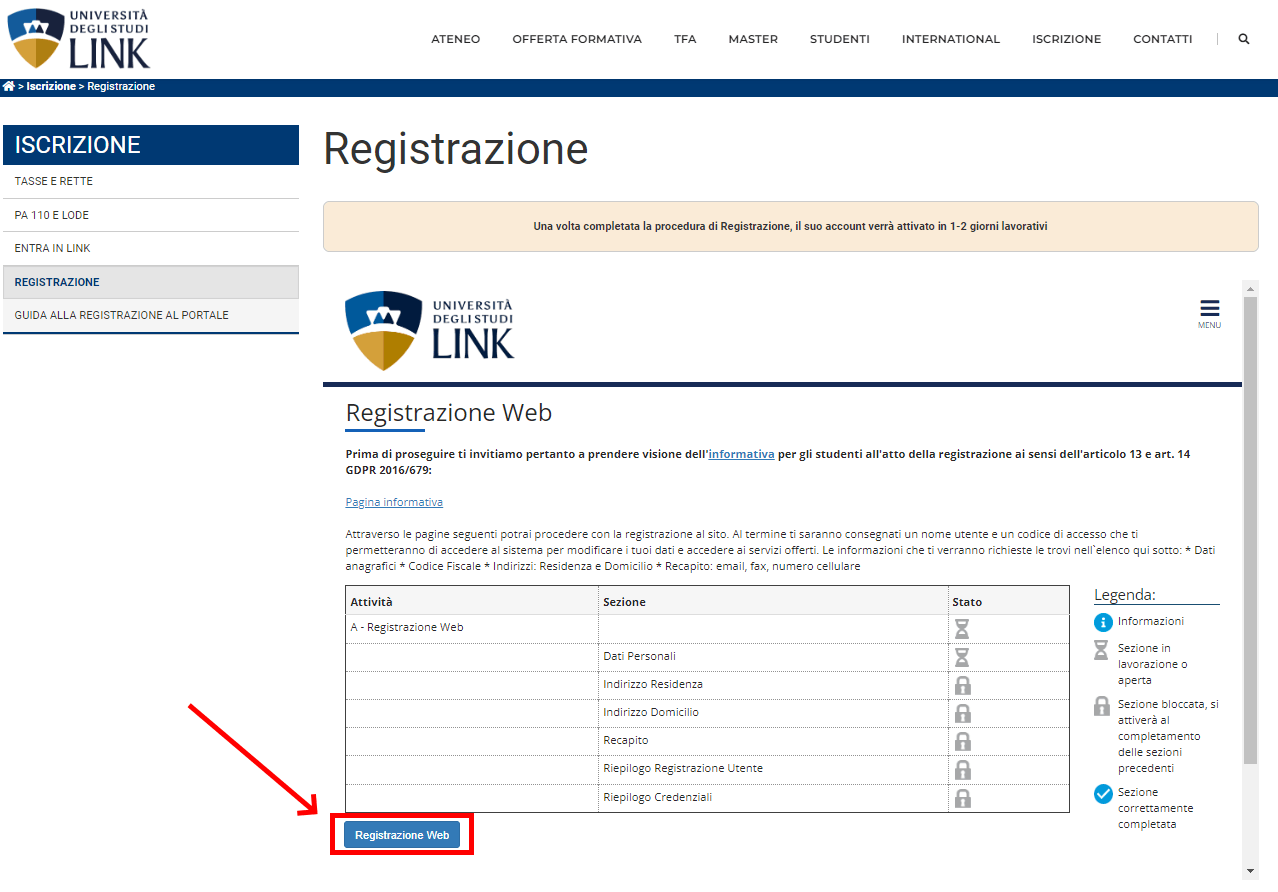
STEP 3 - Fill in the module in its entirety, then click on the "Next" button.
ATTENTION: please verify your tax code, because in case of error the user cannot be registered correctly.
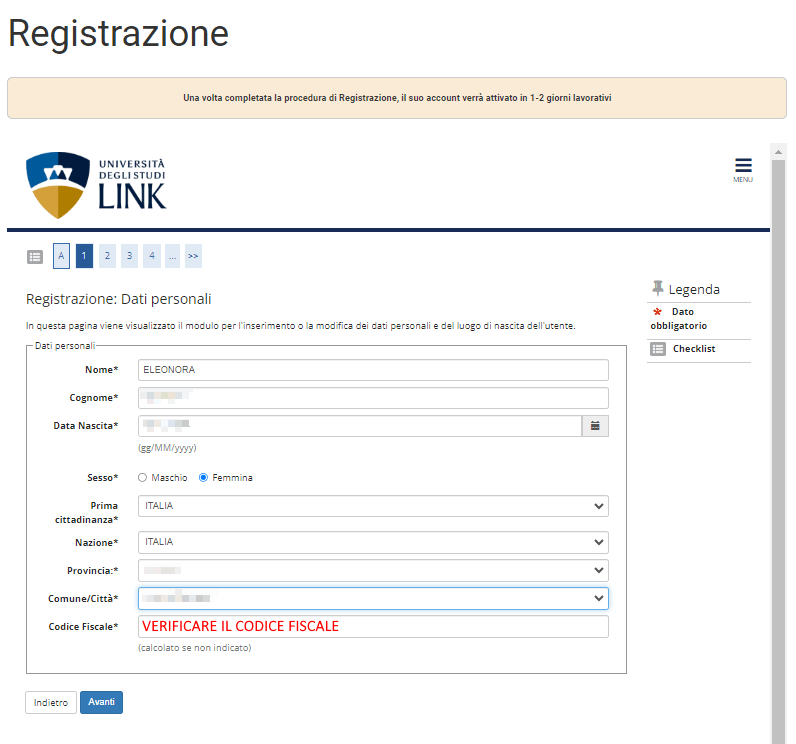
STEP 4 - Fill in the following form with the address of residence as stated in the title of the present section, then click on the "Next" button.
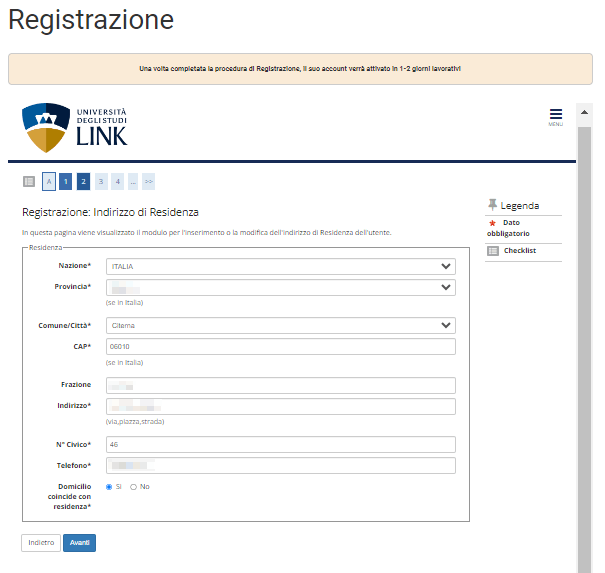
STEP 5 - Fill in the form related to the contact details only on the fields marked with an asterisk, in the "international prefix" field if you are in Italy, use 0039 as shown in the figure. Then click on the "Next" button.
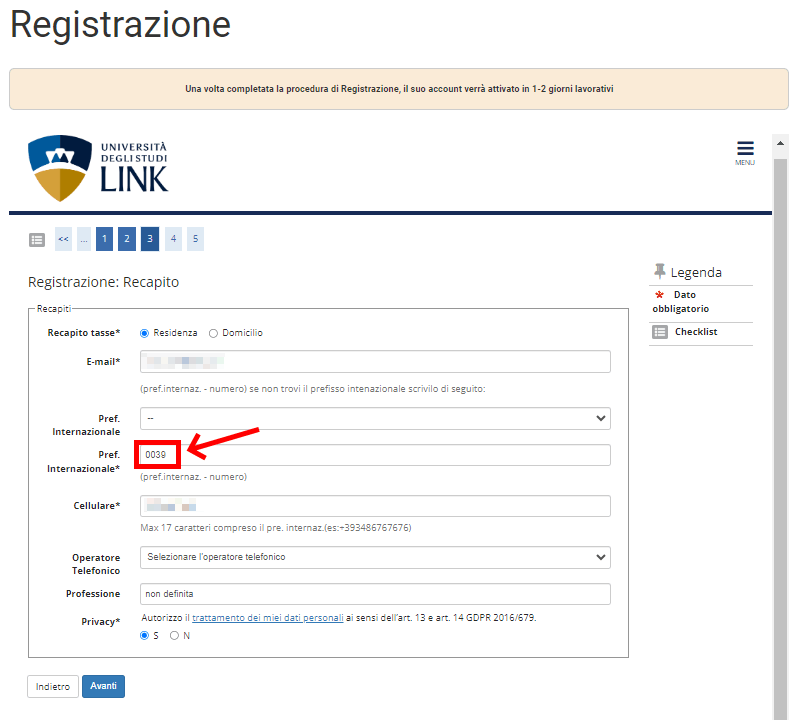
STEP 6 - You will now visualize the summary screen. Verify the correctness of the data and click on the "Confirm" button.
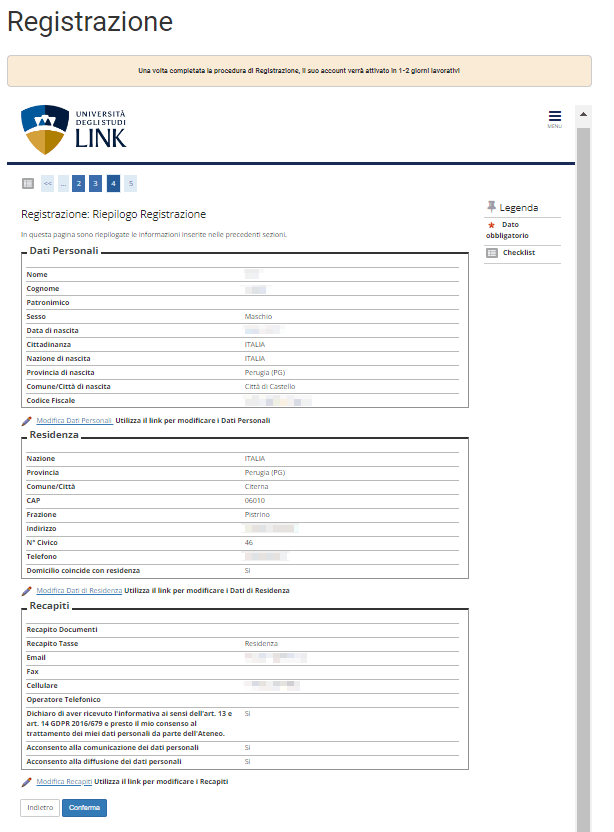
STEP 7 - At the end of the registration process you will receive the login credentials.
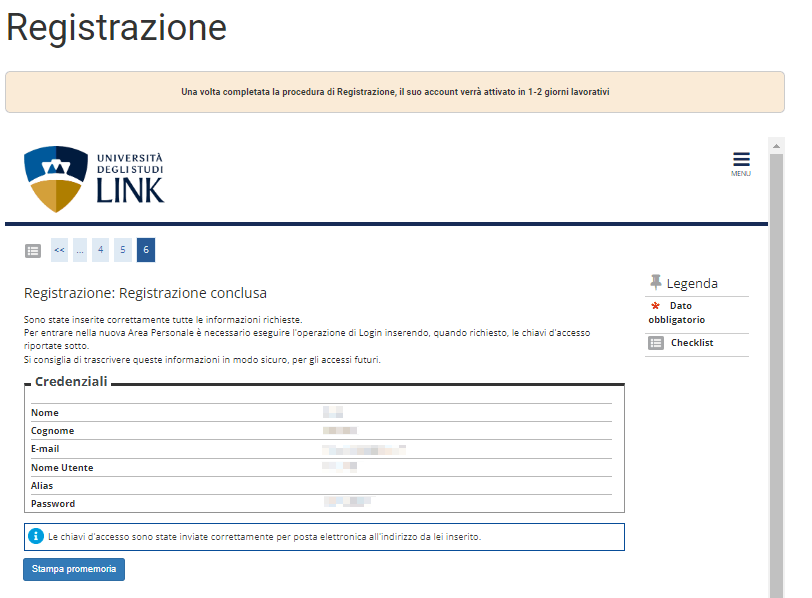
STEP 8 - Return to the Home of the portal and click on the "Access" button on the top right.

STEP 9 - In the following screen click on the "Change Password" button.
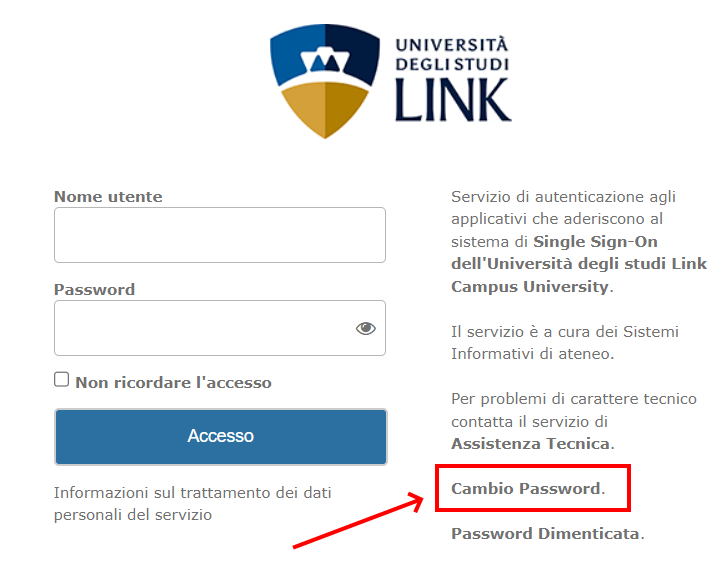
STEP 10 - Enter the previously provided credentials and create a new password. Then click on the "Modify" button.
SECOND PHASE: REGISTRATION FOR THE ADMISSION TEST
![]() Guidelines - procedure of registration to the admission test - Healthcare Professions
Guidelines - procedure of registration to the admission test - Healthcare Professions
STEP 1 - Now you can login to the reserved area (ACCESS TO THE RESERVED AREA).
STEP 2 - Enter the access credentials with the newly changed password.
STEP 3 - Click on the the side menu item "Access to the admission procedure to the Degree Courses"».
STEP 4 - Click on the "Login" button.
STEP 5 - Click on the "MENU" icon at the top right.
STEP 6 - Click on the "Student Administration Office" button and then on "Admission Test" and follow the video instructions.
FOLLOW THE INSTRUCTIONS PROVIDED TO COMPLETE THE PROCEDURE.
